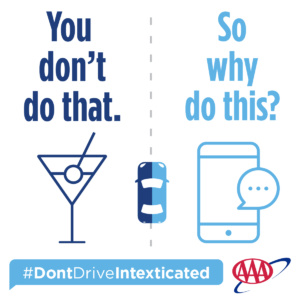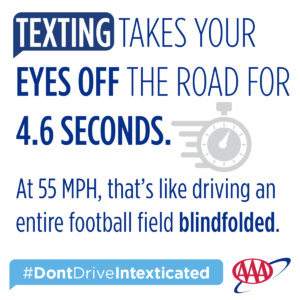BOISE – For April Distracted Driving Awareness Month, AAA is reminding motorists to keep their hands on the wheel and their focus on the road.
AAA’s safety campaign, “Don’t Drive Intoxicated, Don’t Drive Intexticated” equates the dangers of distracted driving with impaired driving. Both are extremely risky and carry deadly consequences.

According to the National Highway Traffic Safety Administration, more than 3,100 people were killed in motor vehicle crashes in 2019 that involved at least one distracted driver. That’s an average of nine deaths per day, an 11% increase from 2018. Every day, 1,000 people are injured in a distracted driving crash.
For the same time period, distracted driving crashes in Idaho were up nearly 7% from the year before (nearly 5,100 crashes total), but fatalities from those crashes dropped by 25%, and serious injuries by 27%. Overall, distracted driving was a factor in 19% of all crashes in the Gem State, and 16% of all fatalities. AAA says that raising awareness is critical as more people move to Idaho.
“The average text takes your eyes off the road for 4.6 seconds, which at 55 mph is like driving the length of a football field blindfolded. That becomes an even bigger deal as our roads get more crowded,” says AAA Idaho public affairs director Matthew Conde. “Even a two-second distraction doubles your chances of being in a crash.”

Motor vehicle occupants aren’t the only ones at risk. NHTSA reports that in 2019, there were 462 pedestrians and 77 cyclists killed nationwide in crashes that involved a distracted driver.
AAA warns that just because some vehicles are equipped with “infotainment” systems that allow drivers to talk, text, check email and use GPS doesn’t mean that they’re safe to use while the vehicle is in motion. Since 2013, the AAA Foundation for Traffic Safety has studied the effects of distracted driving in partnership with the University of Utah. After a review of the infotainment systems in 30 vehicles, 23 were found to generate a high or very high mental workload for drivers.
Because the effects of mental distraction can linger as long as 27 seconds after a distracting task ends, AAA says that there’s no good time to send an email or “like” someone’s social media post from behind the wheel – even if you’re stopped at a traffic light.
AAA has also learned that using infotainment systems is even riskier for older drivers, who took longer (between 4.7 and 8.6 seconds) to complete tasks and experienced slower response times and more visual distractions.
“‘Do as I say, not as I do’ may be the prevailing attitude for some people, but we can’t underestimate the importance of setting a good example, especially for kids and novice drivers,” Conde said. “Please ditch the distractions. If it’s anything more complicated than changing the radio station or adjusting the cabin air temperature, it probably needs to wait.”
For more information and to take the safety pledge, visit AAA.com/intexticated.

